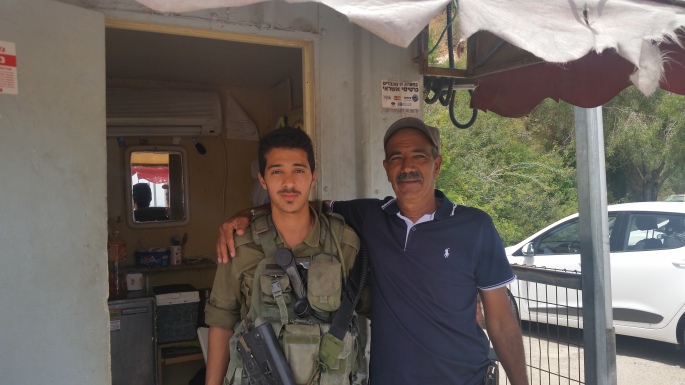
Yesterday my husband had the day off, so we decided to take a short drive to Rosh HaNikra. This is a well-known tourist destination on Israel’s northernmost point on the Mediterranean, right on the Lebanese border.
At the Israeli-Lebanese border checkpost, currently passable only by UN personnel, is a sign in Hebrew, Arabic and English: “Go in peace.” Considering it leads to an enemy frontier controlled by Hizbollah, it’s a lot to hope for, but significant in that the sign is found on the Israeli side of the fence.
The towering limestone cliffs lead to a grotto at sea line, accessible only by cable car. We skipped this in favor of a walk that goes along the coastline from Rosh HaNikra to Achziv Beach, arguably the most beautiful beach in Israel. There are many areas of shoals and tidal pools; the warm seawater is a clear and vivid turquoise; and the beach has a variety of areas for camping, sunning and swimming (though the latter is only in designated areas manned by lifeguards) as well as some crumbling antiquities to explore. On a clear day you can see down the entire northern coast all the way to Haifa Bay. The area is surrounded by kibbutzim and their banana groves.
We were greeted at the entrance by an Israeli soldier who was guarding the area, and Abu Musa, a chatty Arab gentleman who helps control access of the many cars and tourist buses into the parking lot.
“I love the Israeli soldiers and they love me. They even erected a little shelter for me where they know they can come for coffee, tea or cold water whenever they want. I want their mothers to know I take care of their boys and they are in good hands. I have a good life. I don’t earn much, but look! The sun, the sky, the sea, the view, the tourists and the soldiers I love to help — that’s what life is really all about. What more could I possibly ask for?”
I asked if I could take his picture.
“Of course,” he replied, “but only if you include the soldier.”


Hi Galia,
This is Yoel Polsky’s mom. We were just in Nahariya last week, and one of the things we always do, is walk from Nahariya up to Rosh Hanikra, along the tayelet that you describe. You did not describe how you descended from the top down to the paved path along the beach. When we walk, in the opposite direction, from the south to the north, we know where there is a staircase cut through the rocks, which leads to a dirt path. This eventually leads to a lower parking lot, and the road which takes you to the entrance of the area. Anyway, as we were completing the walk (about two hours) we came into this lower parking lot. Lo and behold there was an expensive cell phone lying on the ground. It was apparently lost by an Anglo tourist, on a tourist bus, and was locked for usage.
For many years, we have always greeted the same Arab guard at the entrance, reminding him that we were “that crazy American couple’ who walk up from Nahariya to Rosh HaNikra a couple of times a year. This time, however, we needed to ask him what to do about this cell phone we found. We were chatting with him at length. But his name isn’t Abu Mustafa, it’s Musa. Turns out that his son-in-law has a dental practice in Tzfat, and he fixed a cracked tooth of mine in February. His daughter is a dental hygienist who cleaned both our teeth at the Maccabi dental clinic in Karmiel where she used to work a few years ago. Small world. Anyway Musa assured us that he works closely with the police with lost items of value, and that turning it in to him was the best course of action. Yes, he is a very congenial fellow and is greatly admired by our young men and women who serve on this deceptively peaceful border. By the way, he is one of 15 siblings.
LikeLike
Thank you Mrs. Polsky! Enjoyed the bit of background. Corrected!
LikeLike